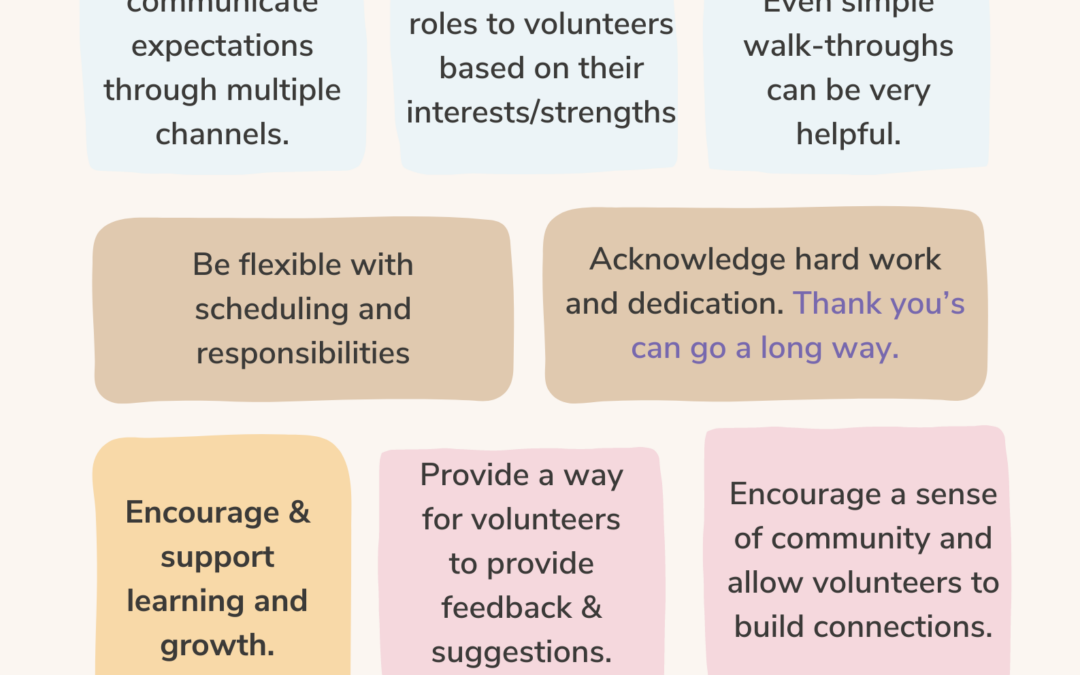
Organizing, Trans Employment Project
Managing volunteers can be a fun and rewarding experience. However, it can also get really messy really quickly. Therefore, it’s important to set clear and well defined expectations early on. Additionally, not all volunteers were created equally. Some folks may need a little more hand holding than others. Remember to practice anti-racism in your relationships when managing all staff and volunteers. We’re each coming to the table with different experiences, skillsets, ambitions, and abilities.
Below are 10 tips for managing volunteers more effectively:
1. Clear Communication
Ensure all instructions and expectations are clearly communicated to your volunteers. Using multiple channels like email, text, and face-to-face briefings ensures that everyone is on the same page.
2. Well-Defined Roles
Assign specific roles to volunteers based on their strengths and interests. Clearly defined roles with clearly defined tasks helps prevent confusion and ensures a smooth operation.
3. Training and Orientation
Provide necessary training and orientation sessions for volunteers. This doesn’t always have to be formal; a simple walkthrough or demonstration might be enough. Start with the absolute basics and don’t assume anyone’s experience or comfort level with the tools and skills they need to know.
4. Flexibility
Be flexible with scheduling and responsibilities. Volunteers are offering their time freely, so accommodating their schedules when possible can increase satisfaction and retention.
5. Recognition and Appreciation
Acknowledge their hard work and dedication. Recognition can be as simple as a public thank you, certificates, or small tokens of appreciation.
6. Feedback Mechanism
Have a system in place for volunteers to provide feedback about the events and actions you are leading. This can help identify areas for improvement and help ensure your volunteers feel valued.
7. Build a Community
Encourage camaraderie among volunteers. Fostering a sense of community, and creating spaces for volunteers to connect socially, can make the experience more enjoyable and increase the likelihood of them volunteering again.
8. Supply Necessary Resources
Ensure volunteers have all the tools and resources they need to perform their tasks efficiently. Lack of resources can lead to frustration and hinder their ability to help.
9. Emergency Preparedness
Prepare your volunteers for any emergencies. Brief them on emergency procedures and ensure they know who to contact in different scenarios.
10. Stay Positive and Supportive
Lead by example with a positive attitude. Support your volunteers by being available and approachable. Your positivity will reflect on their performance and overall experience.

Trans Employment Project
By: Mo Viviane (they/them), Program Manager for Trans Employment Project
As we come together to celebrate Women’s History Month, we must recognize and uplift the contributions and badassery of Trans Women and Femmes in all employment sectors!
Let’s explore the importance of bridging the wage gap, fostering equity, and taking action to create a more equitable reality for us all.
The Wage Gap: A Barrier Yet to be Overcome
The wage gap experienced by Trans Women and Femmes presents a significant barrier to financial and professional success. Studies have shown that Trans Women and Femmes have consistently earned less than their cisgender counterparts, and the disparities are even GREATER for BIPOC Trans Women and Femmes.
According to the National Transgender Discrimination Survey, Trans Women and Femmes earn an average annual income of $10,000 less than cisgender women. The HRC notates more profound pay inequities; whereas cisgender white men earn $1.00, an average of all women earn $0.84, and Trans Women earn $0.61.
The Power of Visibility & Inclusion
Increasing visibility and fostering an inclusive environment are critical steps in combatting the wage gap and building a better future. By acknowledging and uplifting the experiences and achievements of Trans Women and Femmes, we challenge stereotypes and biases while celebrating all of the contributions they bring.
Visibility also plays a crucial role in validating the experiences of Trans folks in the employment sector. Representation in the workplace benefits the individual and has a positive impact on society, breaking down barriers and inspiring others to pursue their passions and goals. Or, as wonderfully as Raquel Willis stated at the Women’s March on Washington in 2017, “As we commit to each other to build this movement of resistance and liberation, NO ONE can be an afterthought. We have a chance to be stronger and better than we ever have before – and that starts with having hard conversations and being held accountable.”
Taking Action Towards an Equitable Future
While awareness is essential, it is through action that we actively mitigate the inequities faced by Trans Women and femmes.
Let’s explore some steps we can take!
1. Implement Equitable Pay Policies: Establishing equitable pay structures that ensure Trans Women and Femmes receive appropriate compensation for their work is vital in bridging the wage gap.
2. Strengthen Diversity, Equity, Inclusion, and Belonging Initiatives: By prioritizing DEIB in all aspects of your organizations, you can create a more inclusive and supportive environment for ALL employees. It is important to ensure that BIPOC Trans Women and Femmes are at the forefront of conversations and policy changes.
3. Providing Support and Resources: Offering resources, mentorship programs, and career advancement opportunities designed to address the unique challenges faced by Trans Women and Femmes is a crucial part of action in the workplace!
- Joining Trans Employment Project: By joining Trans Employment Project as a partner or a member, you are on your way to bridging the wage gap of the Trans Women in our community. As a member, you’ll have access to tips, tricks, and skills training to up your skillset. As a partner, you can sign up to stay plugged into our work or even sponsor our work so that we can continue to move Trans Women out of crisis and into empowerment.
Addressing Anti-Trans and Anti-DEI Bills
Unfortunately, the fight for inclusivity and equity faces ongoing challenges in the form of anti-trans and anti-DEI bills. These bills seek to roll back the progress made in creating a safe and affirming place for Trans people. It’s essential to recognize and address these issues head-on and actively advocate for Trans rights.
By partnering with local advocacy organizations, engaging in educational initiatives, and voicing concerns to policymakers, we can work towards dismantling the barriers these discriminatory bills create that affect every aspect of our community.
As we dedicate Women’s History Month to honoring the achievements of women throughout history, it is time to ACT and INCLUDE Trans Women and Femmes. Together, we can bridge the wage gap, foster inclusion, and create more equitable and empowered workplaces for everyone!
To learn more about Trans Employment Project, visit our programs page: https://transempowerment.org/tep-projects/trans-employment-project/
If you are interested in receiving training from Trans Empowerment Project to level up for the Trans community, follow our training page: https://transempowerment.org/trainings/
Trans Employment Project
 By: Mo Viviane (they/them/theirs), Associate Director of Workplace Equity & Inclusion
By: Mo Viviane (they/them/theirs), Associate Director of Workplace Equity & Inclusion
This LGBTQIA2S+ History Month, I want to highlight an individual who has made an impact in my community, as well as in my life. J Mase III is a poet, educator, and advocate. He has left an indelible mark on the Trans and Queer community, challenging norms and amplifying Black and Brown folks.

Images courtesy of J Mase III
J Mase III captures various forms of artistic expression, from poetry to photography, capturing the essence of his lived experiences and the stories of those who often go unheard. In his poetry, he delves into themes of identity, gender, race, and Queerness. His words create a powerful and introspective journey, inviting readers and listeners to explore their own perspectives and challenge societal constructs.
J Mase III has used his platforms to educate about the experiences and struggles of the Trans community, specifically Black and Brown Trans folks. Through workshops, performances, and public speaking engagements, he has fostered conversations that promote understanding, empathy, and acceptance. He is the author of White Folks Be Trippin’: An Ethnography Through Poetry & Prose. These pieces are inspired by Langston Hughes’s The Ways of White Folks and guide us into accepting what we already know: White Folks Be Trippin’.
As the Co-Director of The Black Trans Prayer Book, an interfaith, multidimensional, artistic, and theological work that collects stories, poems, prayers, meditation, spells, and incantations of Black Trans & Non-binary folks, he has highlighted the intersections of race, gender, and faith. In this, a space of healing and connection within the community is prominent. In 2019, when 25 anti-Trans bills had been introduced in the United States, he created the campaign #TransphobiaIsASin. That number has since increased to 593 bills. This campaign is ongoing, especially since anti-Trans rhetoric and its connection to religious violence have not stopped
that collects stories, poems, prayers, meditation, spells, and incantations of Black Trans & Non-binary folks, he has highlighted the intersections of race, gender, and faith. In this, a space of healing and connection within the community is prominent. In 2019, when 25 anti-Trans bills had been introduced in the United States, he created the campaign #TransphobiaIsASin. That number has since increased to 593 bills. This campaign is ongoing, especially since anti-Trans rhetoric and its connection to religious violence have not stopped
His book And Then I Got Fired: A Transqueer’s Reflections on Grief, Unemployment & Inappropriate Jokes About Death has helped me navigate being a Black Non-binary Queer person who left a pretty messed up workspace, while I was also navigating my grief and the complexities of life as a Transqueer person. J Mase III provides a unique perspective on resilience and growth.
 Back when I was a student at Northern Kentucky University, I had the opportunity to meet with J Mase III. His presence left a profound impact as he shared an immersive experience through poetry and thought leadership. He also led a writing workshop, where he fostered an environment of learning, empathy, and understanding. J Mase III is my Black Trans icon, deserving of so much recognition and admiration. He has inspired me to embrace myself, especially in a world that continues to erase folks like me.
Back when I was a student at Northern Kentucky University, I had the opportunity to meet with J Mase III. His presence left a profound impact as he shared an immersive experience through poetry and thought leadership. He also led a writing workshop, where he fostered an environment of learning, empathy, and understanding. J Mase III is my Black Trans icon, deserving of so much recognition and admiration. He has inspired me to embrace myself, especially in a world that continues to erase folks like me.
For more information on J Mase III and to purchase his books, visit his website at https://jmaseiii.com
Trans Employment Project
By: Mo Viviane (they/them), Associate Director of Workplace Equity & Inclusion
The journey of 2 Spirit, Trans, Intersex and Gender Expansive (2TIGE) folks has often been marked by courage, self-discovery, and resilience. However, it’s a journey with many challenges, particularly within employment. The lack of adequate support and affirmation in the workplace for 2TIGE people can have profound implications for our professional lives and mental health. I want to delve deeper into the intricate relationship between workplace support, mental well-being, and suicide prevention for our community.
The Struggles of 2TIGE Folks in the Workplace
As 2TIGE folks, we face unique hurdles in our professional lives. These challenges can range from subtle forms of discrimination and microaggressions to overt acts of prejudice. Many workplaces lack policies and practices that protect us from discrimination based on our gender identity. This creates an environment of fear and uncertainty, making it challenging to express our authentic selves without fear of backlash.
The absence of support and affirmation takes a toll on our mental health. We are constantly navigating hostile or unwelcoming workplaces that lead to feelings of isolation, anxiety, and depression. The stressors associated with hiding our identities or facing daily discrimination can exacerbate pre-existing mental health conditions and lead to the onset of new ones. The cumulative effect of these challenges can contribute to a heightened risk of suicidal ideation.
The Link to Suicide Prevention
Addressing the lack of support and affirmation in the workplace is crucial to suicide prevention for the 2TIGE community. Throughout my research, I have found that 2TIGE folks are at significantly higher risk for suicide attempts and completion than our cisgender counterparts. A study published in the journal JAMA Surgery reveals that gender-affirming surgeries were associated with reducing suicide risk in our community, and it also highlights the importance of affirming gender identity.
Gender affirmation goes beyond medical procedures: it extends into all aspects of life, like workplaces. A supportive environment improves mental health outcomes and acts as a protective factor against suicidal ideation. Providing your 2TIGE employees with equitable opportunities, recognizing their names and pronouns, and fostering a culture of inclusivity can make a substantial difference in their overall well-being.
Steps Towards Change
- Policy Implementation: Workplaces NEED to establish and enforce policies that explicitly prohibit discrimination based on gender identity and expression! These policies must address restroom access, dress codes, and employee benefits to ensure that 2TIGE folks are treated equitably and respectfully.
- Education & Training: Organizations need to provide education and training for employees to raise awareness of 2TIGE identities, experiences, and the importance of creating inclusive environments. It is not to be the work of your 2TIGE employees to train other folks in the workplace – this is tokenization and can be triggering for folks. Sensitivity training can help mitigate ignorance and foster empathy.
- Affirmative Practices: As an employer, you must implement practices affirming and validating gender identities and expressions. This includes using correct names and pronouns, providing gender-neutral facilities, and supporting gender transition processes (as well as including that support in your grievances policies).
- Mental Health Support: Access to mental health resources is essential. As an employer, you can collaborate with mental health professionals to provide gender-affirming counseling services tailored to your 2TIGE employees. You can also further support by offering 2TIGE folks resources such as Trans LifeLine rather than the general suicide hotline.
Creating workplaces that support and affirm our community is a human right and a fundamental step toward suicide prevention. The connection between workplace environment, mental health, and suicide risks is undeniable. Acknowledging the struggles faced by 2TIGE folks and taking proactive measures to provide safe and inclusive atmospheres at organizations and companies contribute significantly to the overall well-being of your employees while fostering a culture of acceptance and understanding.
In fostering a culture of acceptance and support for 2TIGE individuals, you can make a lasting positive impact. Trans Employment Project is an invaluable resource, offering a wealth of knowledge, guidance, and practical tools to create workplaces where every individual feels valued and respected. By getting involved with Trans Employment Project (TEmP), you’re investing in the well-being of your employees while also committing to more inclusive, diverse, and thriving workplaces.
Together, let’s take proactive steps towards a reality where everyone can excel and flourish!
Trans Employment Project, Uncategorized
By Mo Viviane (they/them), Program Manager for Trans Employment Project
The month of August is about celebrating Black Business Month! It’s essential to recognize and uplift the incredible contributions of Black Trans businesses, freelancers, and entrepreneurs in the business world. As the Program Manager for Trans Employment Project, I am connected with many talented Black business owners, freelancers, and entrepreneurs leaning into the world of meaningful work. It’s important to highlight these stories and successes of Black Trans, Intersex, and Gender-Expansive folks. We consistently foster a more inclusive and equitable business environment, one that celebrates diversity and empowers Black Trans people in all areas of the workplace and business environments!
The Intersection of Identity
Being a Black Trans person from the South, I face many unique challenges arising from the intersections of my race, gender identity, and disability. Relatedly, many in my community face similar issues, such as discrimination and systemic barriers that have hindered our access to opportunities despite our immense talent and creativity. By acknowledging and addressing these issues, WE CAN ALL create a more supportive ecosystem that allows Black Trans business owners, freelancers, and entrepreneurs to thrive.
Breaking Barriers in Entrepreneurship
Historically, entrepreneurship and business management have offered me a promising path to gain financial independence and pursue my passions, especially as a Black Queer Trans Disabled person. In 2021, I went from being completely unemployed, with no means or access to employment opportunities, not only because we were living through the COVID pandemic, but because I had left a previous workplace rooted in white supremacy.
During this time, I sought free educational tools online to boost myself in the social media content sector – where I had no previous knowledge aside from doom-scrolling and content interactions with folks within my small community of followers. As I was in the learning phases, I wondered where the QTIPOC content creators were and found it harder to hear perspectives from folks who looked and identified like me. This catapulted me to be conscious and intentional about the kinds of clients that I wanted to attract.
In a year, I utilized what I had learned and began searching for clients who valued uplifting QTIPOC voices in their work. I landed three clients, two of which I still work for as a freelancer today. I went from having no income to having nearly $25,000 in revenue in my first year. To some, that may not seem like a lot, but it took a chance on myself and my values to find the meaningful work I sought.
So, Mo – what are you getting at here? Bridging the gap between the experiences of Black Trans freelancers, entrepreneurs, and business owners starts with the education and training of our white counterparts. If you are consistently underrepresenting in your collaborations with Black Trans folks, are you honestly taking steps to invest in our future?
Ways to Collaborate
1. Procurement & Partnership:
Make a conscious effort to support Disabled Black TIGE owned businesses by sourcing our products and services or collaborating on projects. Creating sustainable business relationships uplifts the landscape or equitable business practices.
- Mentorship & Education: Offer mentorship programs, workshops or webinars that provide valuable business insights to Black Trans entrepreneurs. Sharing knowledge and expertise can assist us in navigating challenges, developing new skills, and growing our businesses.
- Networking Opportunities: Host events or create platforms for networking where Black Trans business owners can connect with potential clients, partners, and investors. Facilitating these connections can open doors and expand our reach.
- Financial Support: Consider creating a scholarship or grants specifically for Black Trans individuals pursuing entrepreneurship or seeking to grow our businesses. Financial support can be a game-changer and empower us to achieve our goals.
- Marketing & Promotion: Use your platform to promote and amplify the work of Black Trans business owners. Share our success stories, highlight our products or services, and showcase our contributions to the community!
- Advocacy & Policy Support: Advocate for policies promoting diversity, equity, and inclusion in business. Support initiatives that create equal opportunities for everyone and explicitly uplift Disabled Black Trans folks.
- Feedback & Collaboration: Seek feedback from Black Trans business owners on how your organization can better support us. Collaborate on initiatives that align with our needs and aspirations.
Black Business Month provides an opportunity to celebrate and implement better processes to work with creative and innovative Black Trans freelancers, entrepreneurs, and business owners. By fostering an equitable, collaborative landscape, you open up better pathways that continuously shape a future where all voices are heard and all talents are celebrated.
Also, remember creating lasting change requires continuous effort and dedication. By collaborating with Disabled Black Trans business owners all year round, you implement our empowerment and create a more inclusive and vibrant business ecosystem!
Trans Employment Project, Uncategorized
by Mo Viviane
In today’s rapidly evolving workspaces, it’s essential for employers to prioritize diversity and inclusion within their organizations. Fostering a supportive and equitable workspace for all employees, including disabled queer, trans, and intersex people of color (QTIBIPOC), leads to an environment that enables everyone to succeed.
You can implement policies and support systems that specifically address the needs of disabled QTIBIPOC employees, and create a solid foundation for a thriving, accessible workplace.
Here are three strategies your organization can consider to build equity for disabled QTIBIPOC employees:
1. Comprehensive Training & Education for All Staff
To create a culture of inclusion, it’s important to educate ALL staff on the unique perspectives and experiences of disabled QTIBIPOC workers. Implement training programs that cover:
- Understanding intersectionality and its impact on disabled QTIBIPOC employees
- Unconscious bias and how it affects disabled QTIBIPOC in the workplace
- Effective communication and allyship methods for supporting disabled QTIBIPOC co-workers
2. Implement Inclusive & Accessible Hiring Practices
Your organization’s hiring practices greatly impact the diversity of your team. Foster an inclusive recruiting process by:
- Actively seeking and recruiting disabled QTIBIPOC candidates
- Providing accessible formats for job applications and interviews, such as large print, video interviews, and sign language interpreters
- Encouraging the inclusion of disabled QTIPOC individuals in recruitment materials, emphasizing that they are valued and welcome
3. Develop Supportive Policies & Benefits
Ensure that your organizational policies and benefits cater to the needs of disabled QTIBIPOC employees:
- Offering flexible work schedules and remote work options, accommodating various conditions and disabilities
- Providing comprehensive health insurance that covers both physical and mental health needs, including gender-affirming procedures when applicable
- Establishing Employee Resource Groups (ERGs) specifically focused on supporting disabled QTIBIPOC employees, fostering a community where they feel heard, understood, and respected
By implementing these strategies, organizations can create more inclusive workspaces for disabled QTIBIPOC employees, promoting diversity and equity within the workplace and beyond.





 that collects stories, poems, prayers, meditation, spells, and incantations of Black Trans & Non-binary folks, he has highlighted the intersections of race, gender, and faith. In this, a space of healing and connection within the community is prominent. In 2019, when 25 anti-Trans bills had been introduced in the United States, he created the campaign #TransphobiaIsASin.
that collects stories, poems, prayers, meditation, spells, and incantations of Black Trans & Non-binary folks, he has highlighted the intersections of race, gender, and faith. In this, a space of healing and connection within the community is prominent. In 2019, when 25 anti-Trans bills had been introduced in the United States, he created the campaign #TransphobiaIsASin.  Back when I was a student at Northern Kentucky University, I had the opportunity to meet with J Mase III. His presence left a profound impact as he shared an immersive experience through poetry and thought leadership. He also led a writing workshop, where he fostered an environment of learning, empathy, and understanding. J Mase III is my Black Trans icon, deserving of so much recognition and admiration. He has inspired me to embrace myself, especially in a world that continues to erase folks like me.
Back when I was a student at Northern Kentucky University, I had the opportunity to meet with J Mase III. His presence left a profound impact as he shared an immersive experience through poetry and thought leadership. He also led a writing workshop, where he fostered an environment of learning, empathy, and understanding. J Mase III is my Black Trans icon, deserving of so much recognition and admiration. He has inspired me to embrace myself, especially in a world that continues to erase folks like me.